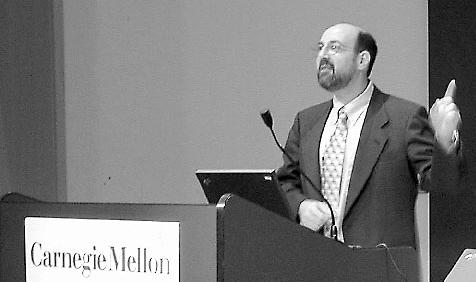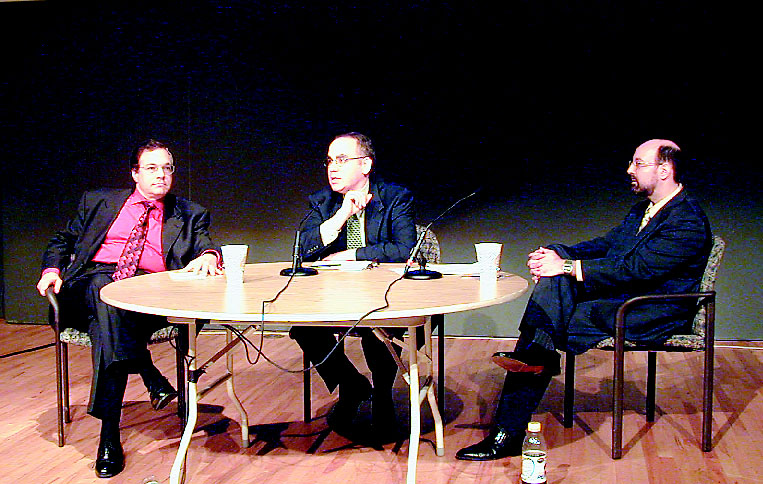
Photo courtesy of The Tartan.
Students and faculty walked on the wild side last Friday afternoon as they gathered for a University-sponsored event that featured illicit materials. "It is Illegal to Display This Slide" read a slide presented by David Touretzky, a principal scientist in computer science, during a debate titled "Are Computer Programs Protected Speech?" held in McConomy Auditorium. The debate took place between Touretzky and Michael Shamos, a professor of computer science, with Peter Shane, a professor of law and public policy, as the moderator.
 Photo courtesy of The Tartan. |
Shamos began Friday's debate with an explanation of First Amendment law and pointed out that there is an immediate conflict between copyright and speech. "You can't speak the words of a copyrighted play in public," said Shamos, explaining that other types of speech, such as dangerous or defamatory speech, are also restricted. Shamos believes that the primary reason computer programs do not deserve full First Amendment protection is that programs "don't just say things -- they do things when fed to a computer."
Touretzky then presented an overview of the Digital Millenium Copyright Act (DMCA), which is a bill passed by Congress in 1998 outlawing the manufacture or distribution of circumvention devices. A circumvention device is considered to be any tool that bypasses access control systems that are often used to prevent the illegal reproduction of copyrighted material. However, much of the concern over the DMCA has stemmed from the fact that circumvention devices can have legitimate purposes -- for example, DeCSS can be used to view DVDs on the Linux operating system, for which there is no approved DVD decryption software. Touretzky said that there are many paradoxes or "catch-22" statements in the DMCA. An exemption clause in the law states that libraries and educational institutions may circumvent access controls to view a work in order to decide whether to purchase it. However, later in the same section, the law states that these institutions may not manufacture or otherwise acquire any product which circumvents a technological measure.
Touretzky discussed his online DeCSS gallery that contains the DeCSS code recorded as a song, printed on a t-shirt, photographed, and represented in other forms. He argued that code should not be restricted by the law since it can express ideas just as standard speech can. "The censorship of ideas is intolerable," said Touretzky in the conclusion to his argument.
However, Shamos believes that the temptation to illegally obtain copyrighted material is far too great to not restrict methods of obtaining such materials. He pointed out that if someone can obtain a movie for free online, they are very unlikely to go out and buy the movie.
"The movie industry has not collapsed -- DVDs are doing just fine," said Touretzky in response. He suggested that it may be impossible to completely eliminate distribution of dangerous code. "Citizens today have communication power that they never had before," said Touretzky, adding that within the foreseeable future, computers will be able to understand English instructions and that the government will have to outlaw speech based on its content.
The professors discussed the possibility that the DMCA will inhibit academic research and possibly motivate organizers of international security conferences to relocate outside of the US.
Earlier this year, Princeton professor Edward Felten was threatened by the Recording Industry Association of America (RIAA) when he and fellow researchers cracked a security protocol that may be used to protect media files. In response, Felten sued the RIAA for interfering with his academic pursuits.
"I think it was a mistake for the industry to threaten Felten," said Shamos. "Felten was not trafficking in a circumvention device."
A question and answer period with the audience brought up the idea that simply the possibility of legal threats cows many people into submission. Shamos and Touretzky both agreed that this is a problem with the law and with the legal system that should be remedied.
When questioned about how copyright infringement should be prevented, Touretzky stressed the need to prosecute violators. He said that the media industry should begin using automated programs that search the Internet for illegally distributed content and should then prosecute these people in accordance with copyright law.
An underlying theme of the debate was that preventing copyright infringement while still allowing for fair use of computer code is a complicated issue that should receive a great deal of public attention and debate in the coming years.
Copyright © 1999-2001 The Tartan Newspaper
